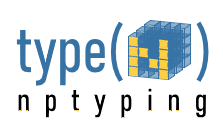Type hints for Numpy.
Project description
Type hints for Numpy!
(❒) Installation
pip install nptyping
(❒) Usage
(❒) NDArray
nptyping.NDArray lets you define the shape and type of your numpy.ndarray.
You can:
- specify the number of dimensions;
- specify the size per dimension;
- specify the type of the array;
- instance check your array with your nptying type.
(❒) Examples
An Array with any dimensions of any size and any type:
>>> from nptyping import NDArray
>>> from typing import Any
>>> NDArray
NDArray[(typing.Any, ...), typing.Any]
>>> NDArray[(Any, ...)]
NDArray[(typing.Any, ...), typing.Any]
>>> NDArray[(Any, ...), Any]
NDArray[(typing.Any, ...), typing.Any]
An array with 1 dimension of any size and any type:
>>> NDArray[Any]
NDArray[(typing.Any,), typing.Any]
>>> NDArray[(Any,)]
NDArray[(typing.Any,), typing.Any]
>>> NDArray[Any, Any]
NDArray[(typing.Any,), typing.Any]
>>> NDArray[(Any,), Any]
NDArray[(typing.Any,), typing.Any]
An array with 1 dimension of size 3 and any type:
>>> NDArray[3]
NDArray[(3,), typing.Any]
>>> NDArray[(3,)]
NDArray[(3,), typing.Any]
>>> NDArray[(3,), Any]
NDArray[(3,), typing.Any]
An array with 3 dimensions of size 3, 3 and any and any type:
>>> NDArray[3, 3, Any]
NDArray[(3, 3, typing.Any), typing.Any]
>>> NDArray[(3, 3, Any)]
NDArray[(3, 3, typing.Any), typing.Any]
>>> NDArray[(3, 3, Any), Any]
NDArray[(3, 3, typing.Any), typing.Any]
An array with any dimensions of any size and type int:
>>> import numpy as np
>>> NDArray[np.int32]
NDArray[(typing.Any, ...), Int[32]]
>>> NDArray[(Any, ...), np.int32]
NDArray[(typing.Any, ...), Int[32]]
Note that provided types are translated to nptyping types.
Pure Python types (.e.g int or float are supported as well).
You can also provide nptyping types yourself: NDArray[(Any, ...), Int[64]].
An array with 1 dimension of size 3 and type int:
>>> NDArray[3, np.int32]
NDArray[(3,), Int[32]]
>>> NDArray[(3,), np.int32]
NDArray[(3,), Int[32]]
An array with any dimensions of size 3 and type int:
>>> NDArray[(3, ...), np.int32]
NDArray[(3, ...), Int[32]]
An array with 3 dimensions of sizes 3, 3, 5 and type int:
>>> NDArray[(3, 3, 5), np.int32]
NDArray[(3, 3, 5), Int[32]]
A structured array:
>>> import numpy as np
>>> NDArray[(Any,...), np.dtype([('x',np.int32), ('y',np.int32)])]
NDArray[(typing.Any, ...), StructuredType[Int[32], Int[32]]]
(❒) Checking your instances
You can use NDArray with isinstance to dynamically check your arrays.
>>> import numpy as np
>>> arr = np.array([[1, 2, 3],
... [4, 5, 6]])
>>> isinstance(arr, NDArray[(2, 3), int])
True
>>> isinstance(arr, NDArray[(2, 3), float])
False
>>> isinstance(arr, NDArray[(2, 3, 1), int])
False
(❒) Finding the right annotation
You can use NDArray to find the type of a numpy array for you using NDArray.type_of:
>>> NDArray.type_of(np.array([[1, 2], [3, 4.0]]))
NDArray[(2, 2), Float[64]]
See also nptyping.get_type (documented below).
(❒) Int
An nptyping equivalent of numpy signed integers.
>>> from nptyping import Int
>>> Int[32]
Int[32]
You can also use one of these:
>>> from nptyping import Int8, Int16, Int32, Int64
(❒) UInt
An nptyping equivalent of numpy unsigned integers.
>>> from nptyping import UInt
>>> UInt[64]
UInt[64]
You can also use one of these:
>>> from nptyping import UInt8, UInt16, UInt32, UInt64
(❒) Float
An nptyping equivalent of numpy floats.
>>> from nptyping import Float
>>> Float[64]
Float[64]
You can also use one of these:
>>> from nptyping import Float16, Float32, Float64
(❒) Unicode
An nptyping equivalent of numpy unicodes.
>>> from nptyping import Unicode
>>> Unicode[100]
Unicode[100]
(❒) Bool
An nptyping equivalent of numpy bool.
>>> from nptyping import Bool
>>> Bool
Bool
(❒) Complex128
An nptyping equivalent of numpy complex128.
>>> from nptyping import Complex128
>>> Complex128
Complex128
(❒) Datetime64
An nptyping equivalent of numpy datetime64.
>>> from nptyping import Datetime64
>>> Datetime64
Datetime64
(❒) Timedelta64
An nptyping equivalent of numpy timedelta64.
>>> from nptyping import Timedelta64
>>> Timedelta64
Timedelta64
(❒) Object
An nptyping equivalent of numpy objects.
>>> from nptyping import Object
>>> Object
Object
(❒) StructuredType
An nptyping equivalent of numpy structured dtypes.
>>> from nptyping import StructuredType, Int
>>> StructuredType[Int[32], Int[32]]
StructuredType[Int[32], Int[32]]
(❒) SubArrayType
An nptyping equivalent of numpy subarray dtypes.
>>> from nptyping import SubArrayType, Int
>>> SubArrayType[Int[16], (4,2)]
SubArrayType[Int[16], (4, 2)]
(❒) get_type
With get_type you can get nptyping equivalent types for your arguments:
>>> from nptyping import get_type
>>> get_type(np.int32)
Int[32]
>>> get_type('some string')
Unicode[11]
>>> get_type(np.dtype([('x', np.int32), ('y', np.int32)]))
StructuredType[Int[32], Int[32]]
(❒) py_type
With py_type you can get the Python builtin type that corresponds to a Numpy dtype:
>>> from nptyping import py_type
>>> py_type(np.int32)
<class 'int'>
Project details
Release history Release notifications | RSS feed
Download files
Download the file for your platform. If you're not sure which to choose, learn more about installing packages.
Source Distributions
Built Distribution
Filter files by name, interpreter, ABI, and platform.
If you're not sure about the file name format, learn more about wheel file names.
Copy a direct link to the current filters
File details
Details for the file nptyping-1.4.3-py3-none-any.whl.
File metadata
- Download URL: nptyping-1.4.3-py3-none-any.whl
- Upload date:
- Size: 31.9 kB
- Tags: Python 3
- Uploaded using Trusted Publishing? No
- Uploaded via: twine/1.13.0 pkginfo/1.5.0.1 requests/2.25.1 setuptools/41.0.1 requests-toolbelt/0.9.1 tqdm/4.32.2 CPython/3.7.3
File hashes
| Algorithm | Hash digest | |
|---|---|---|
| SHA256 |
5631e9f767fcae2541a121baeb4482f7649bc52d26ff1fb2d85da21c8bb61a37
|
|
| MD5 |
2416727507df0386891ec7f184b4a950
|
|
| BLAKE2b-256 |
3dd1ac4cda9e3f3b71c3ddee2f4bbfe0fc05d06fa1455abd217bba7ea48ef977
|

















